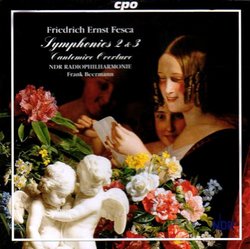| All Artists: Friedrich Ernst Fesca, Frank Beermann, NDR Orchestra, NDR Philharmonic Orchestra (Hannover) Title: Friedrich Ernst Fesca: Symphonies 2 & 3; Cantemire Overture Members Wishing: 0 Total Copies: 0 Label: Cpo Records Original Release Date: 1/1/2003 Re-Release Date: 9/23/2003 Genre: Classical Styles: Opera & Classical Vocal, Symphonies Number of Discs: 1 SwapaCD Credits: 1 UPC: 761203986927 |
Search - Friedrich Ernst Fesca, Frank Beermann, NDR Orchestra :: Friedrich Ernst Fesca: Symphonies 2 & 3; Cantemire Overture
 | Friedrich Ernst Fesca, Frank Beermann, NDR Orchestra Friedrich Ernst Fesca: Symphonies 2 & 3; Cantemire Overture Genre: Classical |
Larger Image |
CD Details |
CD ReviewsOut of the Shadows at Last 12/23/2003 (5 out of 5 stars) "Another of those gifted symphonists who just happened to work in the shadow of Beethoven, Friedrich Fesca is obviously one of the more successful and can be added to the short list that includes Jan Vorisek and Louis Spohr. But whereas Spohr started at the top and dug his way to the bottom in the course of his checkered symphonic career, there is clear evidence of progression in the two Fesca symphonies contained on this excellent CD from CPO. For example, No. 2 announces its Beethovenian pedigree immediately with a direct quotation from the Beethoven Symphony No. 2. The same exact cadence (is it even the same exact orchestration?) begins Fesca's symphony. Later, though, Fesca shows that by around 1810 (when his symphony was written) he had absorbed other influences, including ones from Beethoven's later symphonies. After all, Ludwig was up to around No. 7 by that time.However, it is Fesca's Symphony No. 3 that hints at greater possibilities still. This symphony begins with a leisurely and lyrical introduction that has a clear Romantic stamp to it--one thinks of Weber. Then the movement proper begins with a strangely inchoate theme, more a motive really, that propels the whole movement in a very dramatic fashion. Like Beethoven, Fesca shows an affinity for motivic development. But this movement reminds me much more of Schubert's fine (what there is of it), unfinished Seventh Symphony, which has a similarly dramatic-heroic first movement, with more of a Romantic feel than we find in Beethoven's symphonies. Clearly, by this point in his career Fesca has assimilated Beethoven's influence to the point that it is able to assume much more of a background than a foreground role.Again, the slow movement has an early Romantic aura a la Spohr. And while with the scherzo we are back in Beethoven country (again, I'm reminded of Ludwig's Second Symphony), the finale is really something different. A sonata-rondo, it starts with a slow and stately announcement of the first theme, and as with this type of movement in general, that stateliness returns at intervals to give relief to what turns out to be a remarkably dramatic working out of the theme. A more lyrical second subject hardly has a chance in the midst of the vast, powerful developmental structure that Fesca builds from that stately first theme. A memorable movement indeed.The "Cantemire Overture" is a dramatic work in the manner of Weber's "Der Freischutz Overture" and not too many cuts below Weber at his best, either. All in all, Fesca emerges as an important composer of orchestral music, one that has remained far too long in the shadows.Obviously Frank Beermann and his orchestra think of this as important music as well, and they play it for all it's worth. Fine sonics, too, that judiciously balance warmth and brilliance. If you like the best music of the era of Beethoven, Schubert, and Weber, you won't want to pass on this disc." Wonderful pieces! Suddhaseel Sen | 08/31/2008 (5 out of 5 stars) "I got this CD for free, along with a CPO disc of Kalliwoda's symphonies that have got excellent reviews elsewhere. I confess that I was much more impressed by Fesca, in fact, much more than than any of the other composers justly championed by CPO, except for Marschner (whose piano trios are wonderful - try them by all means) and Goetz (whose orchestral and vocal works are just wonderful). Music criticism still clings to the notion of originality as the most important hallmark of great art, and by this criterion Fesca's symphonies are, perhaps, no better than that of talented second-rung symphonists like Spohr, Arriaga and Vorisek. However, as far as the quality of invention is concerned, Fesca's symphonies brings to mind those by more famous names: Weber's First, Schubert's Fifth, Gounod's two symphonies and Bizet's teenage one in C-major. Fesca's first movements are well-argued and never too long, the second movements combine depth of feeling with a genuine melodic gift, the scherzos are inventive, and the finales have genuine momentum - for samples of the best music, try the finale of No. 2 or the slow movement of No. 3. The "Catemire" Overture is, perhaps, not as memorable as the symphonies, but is quite enjoyable in its own right. The music has a winning youthful freshness that, no wonder, elicits committed performances from Beermann and the NDR Philhamonic - this disc is definitely worth going for!" In the shadow of Beethoven Emil A. Franzi | Tucson, AZ, USA | 12/24/2007 (4 out of 5 stars) "Fesca, like Czerny and Ries, was one of those outstanding second stringers who's symphonies CPO and other outfits have re-discovered. Someone once said of Boyce "he's second string Handel but very good second-string Handel." Fesca is very good second-string Beethoven. Give him and the other guys a try - you won't regret it.
Emil Franzi, Tucson" |
